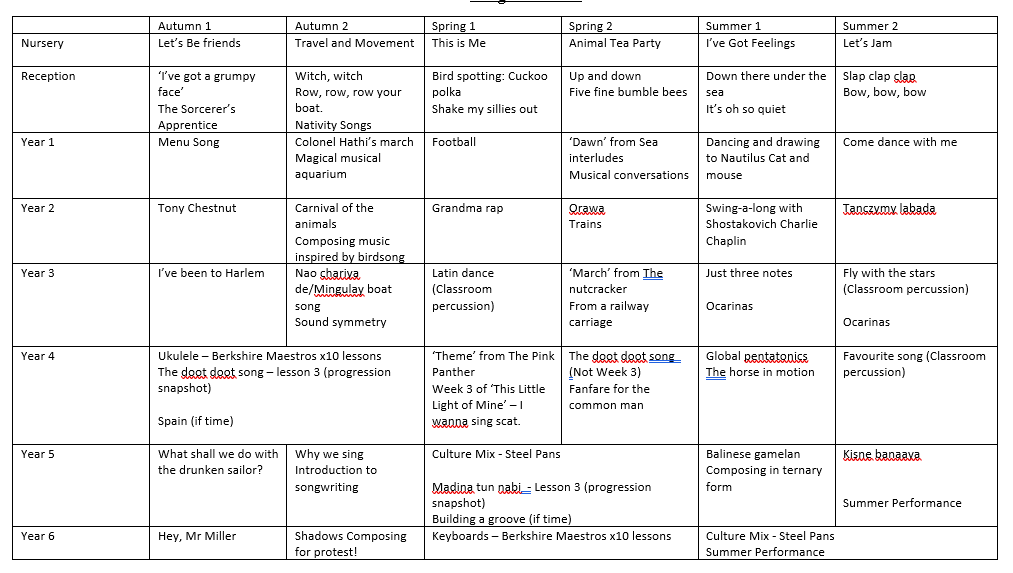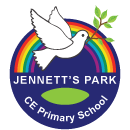Jennett's Park Music Development Plan
Music - Intent, Implementation, Impact 
Intent
‘A high-quality music education should engage and inspire pupils to develop a love of music and their talent as musicians, and so increase their self-confidence, creativity and sense of achievement.’ Department of Education, National Curriculum
At Jennett’s Park CofE we aim to deliver a curriculum which enables children to reach their full potential in music, providing them with a solid foundation in musical skills, knowledge and understanding. We understand how listening to and evaluating music deepens children’s understanding and ensure that our children have opportunities to experience and appreciate music across a range of historical periods and genres. Through singing, learning how to play a variety of instruments and by having the opportunities to create their own music we aim to inspire a love of music as well as providing our children with the skills to become confident performers, composers and listeners. By participating in a range of musical experiences we want our pupils to forge their own musical journey, discovering areas of strengths as well as areas they might like to improve upon and develop further. We encourage our children to collaborate and support each other as they learn together by singing, playing and performing in ensemble contexts as well as solo, promoting our school values and learning behaviours. At Jennett’s Park CofE we not only want our children to learn about music but become musicians.
Implementation
Through the teaching of music our children develop skills in Singing, Listening, Composing, Musicianship, and Performance. This document shows the whole school progression for each of these areas, with the intention of making the objectives for each year group consistent and in line with National Curriculum, Model Music Curriculum and the Statutory Framework for the Early Years Foundation Stage.
We deliver our music curriculum through ‘Sing Up Music’; a progressive music scheme of work, which is designed to ensure full coverage of the learning objectives in in the Progression Document. Sing Up Music delivers a fully integrated approach to musical development allowing our children to learn, understand and use the interrelated dimensions of pitch, duration, dynamics, tempo, timbre, texture, structure and notation while experiencing music from a range of musical traditions and genres. The long-term plan shows which Sing Up Units are taught by each year group in the Autumn, Spring and Summer terms.
Music Progression of skills Sing Up overview
Impact
As regular practice is an important factor in the success of musical learning, we aim for a ‘little and often’ approach, and teach music through weekly lessons. Lessons are organised into 3 or 6 week units and are based around a song. The musical learning flows from the features of this song and takes on an integrated approach, combining singing, playing, listening, improvising and composing. This approach ensures the children get a rich learning experience covering all aspects of music. Units of learning are sequenced so that previous skills and knowledge are returned to and built upon, providing children with the opportunities to review, remember, deepen and apply their understanding. To use alongside our progression document and long term plan, Sing Up offers a clear progression of skills and knowledge to accompany each unit, which sets out how the children progress throughout the year. Each unit also provides lesson plans, knowledge organisers and assessment guidance which supports the teaching of vocabulary, genre, style, instrumental parts for improvisation and composition, listening and appraising, and the interrelated musical dimensions. At times we may allocate our teaching time into shorter sessions across the week, especially if there is a specific skill we want to introduce or develop, or if we are rehearsing for a performance.
In addition to the scheme, children are given the opportunity to learn to play tuned instruments through separate lessons. In Key Stage 2 children receive high-quality sessions learning tuned instruments from our music hub. Children are also given lots of opportunity to use their musical knowledge and skills in singing assemblies, concerts and performances throughout the year.
Impact
We encourage our pupils to enjoy and value Music and to gain an increased understanding of how it can enrich their own and others’ lives – either as a listener, creator or performer. Through our curriculum and musical experiences children are enthused and engaged in the wide variety of music activities. They have opportunities to sing, listen and respond to a variety of different styles and genres of music and are taught the musical vocabulary needed to describe and appraise the music that they are listening to. Through singing and playing a range of percussion and tuned instruments, our children develop an understanding of pulse, rhythm, pitch and notation as well as given the opportunities to explore and create their own compositions and evaluate the effectiveness of their ideas.
They show understanding and use musical vocabulary within their lessons, demonstrating a progression of the knowledge and skills which are being continuously built on and embedded. Through music, children develop their confidence, creativity and commitment as well as skills of collaboration and communication. They are learning to work both independently and as part of a group, ensuring skills of resilience and teamwork are promoted in this subject.
Opportunities to perform outside of school, within our local environment ensure our children understand its significance and place within the wider world and that these excite and inspire children’s thirst for knowledge and participation in this subject. The way pupils’ showcase, share and celebrate their work through their own performance will best show the impact of our curriculum. Digital evidence of these, Termly Progression Snapshots and children’s own recordings and comments is collected to show evidence of understanding and progression.
